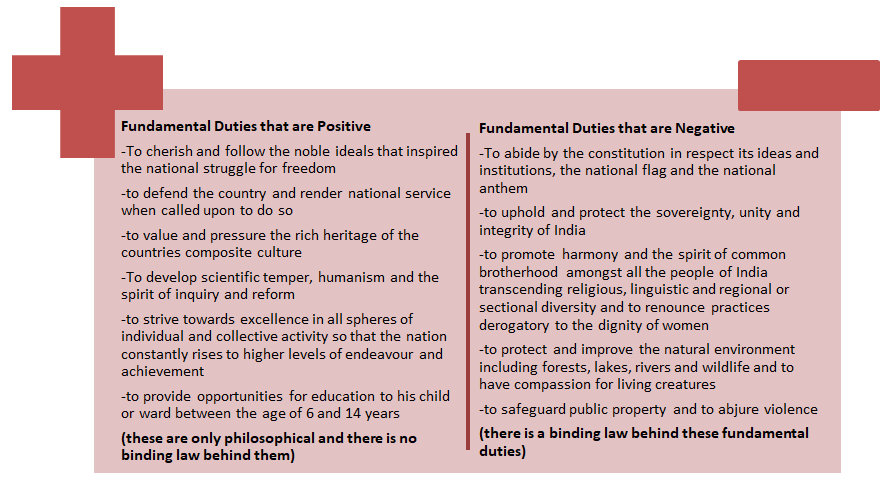Fundamental Duties
The Government is planning to assign its different Ministries with the task of spreading awareness about Fundamental duties among people.
- The idea of Fundamental Dutiesis inspired from the Constitution of Russia.
- These were incorporated in Part IV-Aof the Constitution by the 42nd Constitutional Amendment Act, 1976 on the recommendations of Swaran Singh Committee.
- Originally 10 in number, one more duty was added through the 86thConstitutional Amendment Act, 2002. All the eleven duties are listed in Article 51-A of the Constitution (the sole Article in Part-IV-A).
- The fundamental duties serve as a reminder to citizens that while enjoying their rights, they have also to be quite conscious of duties they owe to their country, their society and to their fellow-citizens.
- However, like the Directive Principles, the duties are also non-justiciable in nature.
List of Fundamental Duties
- To abide by the Constitution and respect its ideals and institutions, the National Flag and the National Anthem;
- To cherish and follow the noble ideals that inspired the national struggle for freedom;
- To uphold and protect the sovereignty, unity and integrity of India;
- To defend the country and render national service when called upon to do so;
- To promote harmony and the spirit of common brotherhood amongst all the people of India transcending religious, linguistic and regional or sectional diversities and to renounce practices derogatory to the dignity of women;
- To value and preserve the rich heritage of the country’s composite culture;
- To protect and improve the natural environment including forests, lakes, rivers and wildlife and to have compassion for living creatures;
- To develop scientific temper, humanism and the spirit of inquiry and reform;
- To safeguard public property and to abjure violence;
- To strive towards excellence in all spheres of individual and collective activity so that the nation constantly rises to higher levels of endeavour and achievement; and
- To provide opportunities for education to his child or ward between the age of six and fourteen years (added by the 86th Constitutional Amendment Act, 2002).

Previous year’s questions :
Prelims:
- Under the constitution of India, which one of the following is not a fundamental duty?(2011)
- to vote in public elections
- to develop the scientific temper
- to safeguard public property
- to abide by the constitution and respect its ideals
2. Which of the following is/are among the fundamental duties of citizens laid down in the Indian constitution?(2012)
- to preserve the rich heritage of our composite culture
- to protect the weaker sections from social injustice
- to develop the scientific temper and spirit of inquiry
- to strive towards excellence in all spheres of individual and collective activity
Select the correct answer using the code given below:
- 1 and 2 only
- 2 only
- 1, 3 and 4 only
- 1, 2, 3 and 4 only
3. Which of the following statements is/ are true of the fundamental duties of an Indian citizen?(2017)
- legislative process has been provided to enforce these duties
- they are correlative to legal duties
Select the correct answer using the code given below:
- 1 only
- 2 only
- Both 1 and 2
- Neither 1 nor 2
4. In the context of India, which one of the following is the correct relationship between rights and duties?(2017)
- rights are correlative with duties
- rights are personal and hence independent of society and duties
- rights, not duties are important for the advancement of the personality of the citizen
- duties, not rights are important for the stability of the state
Answers:
- (a)
- (c)
- (d)
- (a)
Mains:
- Essentially all that is contained in part IV-A of the constitution is just a codification of tasks integral to the Indian way of life. Critically examine this statement.
- Enumerate the fundamental duties incorporated in the constitution after the 42nd amendment. (2008)
Answers:
- Fundamental duties contained in part IV-A of the constitution were inserted by the 42nd amendment of the constitution on the recommendations of the Swaran Singh committee. It was inserted in the constitution to make the fundamental rights more meaningful. In fact, there can be no rights in a society where there are no duties.
Fundamental duties also include cherishing and following the noble ideals that inspired our freedom struggle, upholding the sovereignty and integrity of the nation, rendering national services, promoting harmony and brotherhood, renouncing practices derogatory to the dignity of women, safeguarding public property, developing scientific temper etc.
These duties find justification in cultural ethos of India. all religious texts and ancient writing always favoured to protect and improve natural environment. Compassion for all life forms is something that is embedded in Indian way of life. Since ancient times, people accorded respect for various natural forces, plants and animals. ‘Sarvadharma Samman’ an age-old concept in India, which promotes fraternity. Worship of goddess hints towards paying respect to women.
However, there are few practices that go against the ideals of fundamental duties. Incidents like destruction of public property by violent mob and protesters, delivering of note speeches that cause disharmony among communities, mounting corruption, declining child ratio points towards the fact that our country has not succeeded completely in installing the values contained in part 4, in the hearts and minds of the citizens.
These values should be taught from the early childhood through a free, fair, secular and non-discriminatory education system the society also needs role models from all walks of life such as politics, business, administration, judiciary, Academy etc.
- In 1976, the Sardar Swaran Singh committee recommended the incorporation of the fundamental duties in view of its necessity felt during the internal emergency of 1975-77. Accordingly a new part, namely part IV-A was added to the constitution consisting of article 51 a containing 10 fundamental duties. In 2002, through 86th amendment act, one more fundamental duty added. Indian constitution adopted the idea of fundamental duties from the constitution of erstwhile USSR.
Some of the fundamental duties are moral duties while some are civic duties. These are confined only to the citizens. Like the directive principles of state policy the fundamental duties are non- justiciable. However the parliament is free to enforce them by appropriate legislation. The fundamental duties as guaranteed by the constitution are as follows :
- To abide by the Constitution and respect its ideals and institutions, the National Flag and the National Anthem;
- To cherish and follow the noble ideals that inspired the national struggle for freedom;
- To uphold and protect the sovereignty, unity and integrity of India;
- To defend the country and render national service when called upon to do so;
- To promote harmony and the spirit of common brotherhood amongst all the people of India transcending religious, linguistic and regional or sectional diversities and to renounce practices derogatory to the dignity of women;
- To value and preserve the rich heritage of the country’s composite culture;
- To protect and improve the natural environment including forests, lakes, rivers and wildlife and to have compassion for living creatures;
- To develop scientific temper, humanism and the spirit of inquiry and reform;
- To safeguard public property and to abjure violence;
- To strive towards excellence in all spheres of individual and collective activity so that the nation constantly rises to higher levels of endeavour and achievement; and
- To provide opportunities for education to his child or ward between the age of six and fourteen years (added by the 86th Constitutional Amendment Act, 2002).
These make the citizens conscious of their duties besides enjoying their rights.


![Prayas-लक्ष्य [UPSC CSE Target] The Prayas India](https://theprayasindia.com/wp-content/uploads/2021/08/Prayas-लक्ष्य-UPSC-CSE-Target-The-Prayas-India-300x167.png)

![Prayas Pre-भेदश [UPSC CSE Prelims Test Series] The Prayas India](https://theprayasindia.com/wp-content/uploads/2021/08/Prayas-Pre-भेदश-UPSC-CSE-Prelims-Test-Series-The-Prayas-India-300x167.png)









